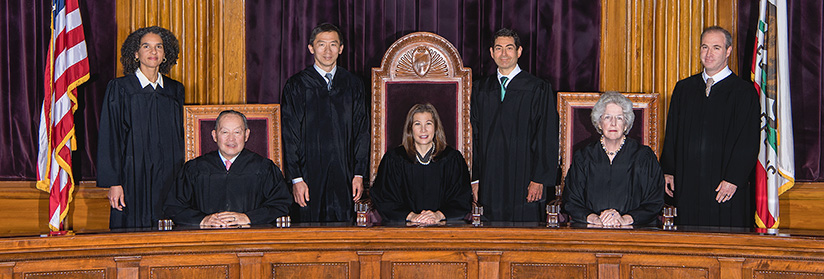
California Supreme Court Justices (courts.ca.gov)
CA Supreme Court Rules Against Uber; Big Win for California Workers
Uber currently deciding on appealing to U.S. Supreme Court
By Evan Symon, July 18, 2023 2:59 pm
In a unanimous ruling on Monday, the California Supreme Court ruled that Uber could not limit the ability of drivers to take the company to court for labor law violations, despite signing an agreement to bring their own work-related legal claims in private arbitration with the company.
Adolph v. Uber dates back to 2019 when an UberEats driver, Erik Adolph, first sued Uber over claims that Uber had misclassified UberEats drivers as independent contractors. While a law passed later in the year, AB 5, pushed companies to reclassify workers as employees, and thus be eligible to receive work expense reimbursements, the law was not yet in place at the time of the lawsuit. Instead, Adolph sued, with Uber immediately countering that he had signed an agreement to take all employment related disputes into arbitration, and thus not be able to lead a case on behalf of other drivers.
Central to the case was the Private Attorney General Act (PAGA), which allows workers to sue on all employment law violations on behalf of California. Under PAGA, victories by the plaintiffs would receive 1/4 of all money awarded, with the rest going to the state. Uber argued that, due to Adolph signing the agreement PAGA would not cover him. However, following a four-year-long court battle, the California Supreme Court finally reached a ruling on Monday, finding in favor of Adolph.
According to the ruling, the court unanimously agreed that Adolph couldn’t sign away his right to take all employment disputes into arbitration on behalf of others, with PAGA saying that nothing in the law could stop workers going through claims in arbitration and having a lawsuit at the same time.
“An order compelling arbitration of the individual claims does not strip the plaintiff of standing as an aggrieved employee to litigate claims on behalf of other employees under PAGA,” said Justice Goodwin Liu on Monday in the majority opinion. “The question here is whether an aggrieved employee who has been compelled to arbitrate claims under PAGA maintains statutory standing to pursue PAGA claims arising out of events involving other employees. We hold that the answer is yes.”
While a 2022 Supreme Court ruling, Viking River Cruises v. Moriana, had previously ruled the opposite, California’s PAGA law had opened up a loophole, with Justice Sonia Sotomayor specifically noting that PAGA was a matter of state, not federal, breathing new life into the Adolph case last year.
“A lot of employers did not want Adolph to go through,” explained employment lawyer Esteban Gomez Jr. to the Globe on Tuesday. “They’re afraid that the ruling will now lead to a lot more lawsuits that could have easily been worked out in less expensive arbitration. They’re called “shakedown” lawsuits. PAGA was widely thought to not cover this, but, well, as we saw yesterday, the California Supreme Court found a way out and used it.”
“There is still the option for the Supreme Court though. We saw how they ruled on Viking Cruises last year, so if it is brought back up, that window that was opened for them could be shut for good.”
As of Tuesday, Uber is still deciding on whether or not to bring the case to the U.S. Supreme Court.
- Awareness Of California’s Transitional Kindergarten Drops Dramatically as First School Year Approaches - July 24, 2025
- Kamala Harris Continues to Receive Backlash Against Her One Year Presidential Run Anniversary Post - July 23, 2025
- AG Bonta Wants Los Angeles County Juvenile Halls Under Receivership - July 23, 2025






What this really means is that there are going to be a lot less jobs. Why would a company want to hire people in California if their employment contracts are automatically null and void? And as commented at the end of this article, this opens up the door to all sorts of “troll lawsuits” from people who are going to seek to get hired in bad faith so that they can sue their erstwhile employer. Which just means even less companies are going to want to do business in this state.